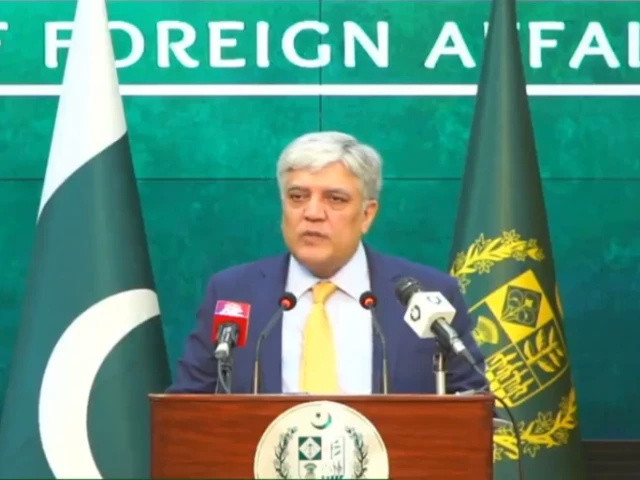Islamabad:
Pakistan has firmly rejected the unfounded statements made by Indian leaders during Lok Sabha’s recent debate about the so -called “Sindor Operation”. According to the Ministry of Foreign Affairs, the statements are part of a broader pattern to distort facts, justify the aggression and glorify the conflict for national purposes.
During an informative media session on Friday, FO spokesman Shafqat Ali Khan declared that India’s attack against Pakistan, attacked to the alleged terrorist infrastructure, resulted in the loss of innocent lives. Despite this, Pakistan successfully neutralized Indian combat planes and military objectives, highlighting the failure of India’s military objectives.
“The world knows that India attacked Pakistan without any verifiable evidence or credible research on Pahalgam’s attack,” he said. “Pakistan’s actions to defend his territory were indisputable, and we strongly reject any additional claim with respect to the so -called ‘Operation Mahadev’,” he added.
The spokesman also criticized India for rejecting Pakistan’s offer for transparent and independent investigation into Pahalgam’s attack. Instead of looking for diplomatic solutions, India intensified tensions, which led Pakistan to request the recognition of the military losses of India and the role of third parties to ensure the high fire, said the statement.
Pakistan has constantly rejected India’s rhetoric in establishing a “new normality” in bilateral relations. Khan reiterated that for Pakistan, the “normal” relationships should be based on respect for sovereignty, territorial integrity and compliance with international law, as described in the UN Charter. He also reaffirmed Pakistan’s preparation to counteract any future aggression, as demonstrated in May.
The FO spokesman also dismissed the statements of the “nuclear blackmail”, qualifying it as tactics to obscure the stairs of India themselves. He clarified that Pakistan’s deterrence is based on his conventional abilities, underlining his principles of discipline and moderation.
Regarding the Treaty of the Water of the Indo, Pakistan strongly condemned India’s decision to suspend the agreement, describing it as a violation of international commitments. Khan urged India to immediately honor his obligations under the treaty.
Read too: Pakistan hit a 19 percent rate when Trump points to dozens of countries with new tasks
He also expressed concern about Indian dependence on misinformation and nationalist rhetoric, warning that such actions endanger regional stability. “However, Pakistan is still committed to peace, stability and significant dialogue to address long -standing problems, including Jammu and Kashmir’s dispute,” he said.
The informative session also highlighted the diplomatic activities of the Vice Prime Minister and Minister of Foreign Affairs, ISHAQ Dar, who visited the United States from July 20 to 28. The FO mentioned that during his term as president of the UN Security Council, he presided over a session focused on improving cooperation between the UN and the Islamic Cooperation Organization (IIC).
In regional matters, FO spokesman welcomed the positive conclusion of the Malaysian special meeting on the situation of Cambodia-Thailandia, expressing hope of a peaceful diplomatic resolution.
Read: Five martyred policemen when Katcha Bandits attack the control post in Rahim Yar Khan
He also commented on Pakistan successfully launching his remote sensing satellite from the Xichang Satellite launch Center in China. The satellite will greatly improve Pakistan’s abilities in urban planning, disaster management, agricultural monitoring and climate change research, he added.
The spokesman also said that Pakistan looked towards the next state visit of Iranian President Dr. Masoud fishshkian during the weekend. The visit is expected to mark his first official visit to Pakistan as president, further solidifies the strong and lasting relationship between the two nations, he said.
The informative session concluded with a summary of the continuous commitment of Pakistan with regional cooperation, including his dialogues with high -level officials from China, Iran and Turkey, reaffirming Pakistan’s approach in promoting peace and stability throughout the south of Asia and beyond.
Read more: GHQ commemorates the 98th anniversary of the PLA of China
Answering a question about the case of Dr. Aafia Siddiqui, the spokesman dismissed the speculation that Pakistan had changed his position. “There is no policy change,” said the spokesman. “The government continues to pursue its case through diplomatic, legal and humanitarian channels.”
He reiterated that the Government has constantly followed the case of Dr. Siddiqui since his 2010 condemnation, using high level diplomacy, consular access, legal assistance and clemency appeals to press for his release from the custody of the United States.
“Attempts on social networks to misrepresent government efforts in this regard are unfortunate,” he added. “Pakistan will continue to chase all diplomatic and legal channels to ensure the release of Dr. Aafia Siddiqui while defending international law and bilateral cooperation.”




